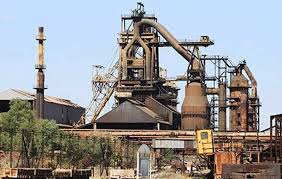
Daniel Otera
Efforts to revive Nigeria’s dormant industrial colossus, the Ajaokuta Steel Company in Kogi State, have taken a new turn as the Federal Government intensifies strategic engagements with Chinese steel conglomerates.
The renewed diplomatic and investment drive, led by the Minister of Steel Development, Prince Shuaibu Abubakar Audu, signals a high-level push to actualise the decades-old dream of industrial steel production in Nigeria’s North Central.
On a recent working visit to Beijing, Prince Audu, accompanied by a Nigerian delegation, held closed-door meetings with major Chinese industrial players including Sino Steel (a subsidiary of Baowu Group), Fangda Steel Group, and Jingye Steel Group. These companies rank among the world’s leading steel manufacturers, with a combined production capacity exceeding 80 million metric tonnes annually.
A statement by the Minister’s media aide, Lizzy Okoji, quoted him as reaffirming President Bola Ahmed Tinubu’s determination to bring Ajaokuta into full operation before the end of his administration’s first term. The commitment, the Minister said, is embedded in the administration’s wider industrialisation roadmap under the Renewed Hope agenda.
“The Tinubu administration is determined to revive Ajaokuta Steel Company before the end of this current administration,” Prince Audu reportedly told stakeholders in Beijing. “We are working to create sustainable technical and financing frameworks that will attract long-term investment from key partners like China.”
Once touted as the backbone of Nigeria’s industrial revolution, the Ajaokuta Steel Company in Kogi State remains a sleeping giant more than four decades after construction began. Built on an expansive 24,000-hectare site along the Ajaokuta-Itakpe axis, the facility was envisioned in 1979 as the engine of national industrialisation. However, it has never produced steel at any commercial scale.
According to historical data and reporting by The Punch and Blueprint Newspapers, successive Nigerian governments have invested over $8 billion into Ajaokuta through construction, salaries, rehabilitation contracts, and maintenance costs since inception with zero return on investment in terms of steel output.
From 1999 to 2021, budgetary allocations to the plant covering wages, power, upkeep, and administrative costs reportedly surpassed ₦650 billion, according to estimates derived from NEITI reports and analysis by EconomyPost and DataPost Nigeria. Between 2016 and 2023 alone, at least ₦29.6 billion was spent on staff salaries for a facility that has remained idle for decades.
Despite a long list of promises and revival plans from Russia to India, and most recently China, public confidence in the project continues to erode. Local residents and industry watchers in Kogi view the facility as a symbol of decayed infrastructure, mismanaged ambition, and broken political pledges.
Yet, the potential remains vast. Experts estimate that a fully operational Ajaokuta could generate over 500,000 direct and indirect jobs, boost local content in Nigeria’s manufacturing ecosystem, and reduce the country’s overdependence on imported steel a sector that currently gulps over $4 billion annually in imports, according to data from the Raw Materials Research and Development Council (RMRDC).
Speaking to The Journal,via phone call Lokoja-based mechanical engineer, Usman Bello, said:
“If Tinubu’s administration succeeds in reviving Ajaokuta, it would be one of the most important industrial achievements since independence. But people are tired of hearing the same story for 40 years.”
During the China visit, discussions reportedly centred on conducting fresh technical audits, establishing joint-venture management models, and unlocking long-term financing options through public-private partnerships. Also part of the delegation was Mr. Joseph Tegbe, Director General of the Nigeria-China Strategic Partnership (NCSP), who described the talks as “a step towards aligning China’s industrial capacity with Nigeria’s development aspirations.”

The Minister’s current push builds on a long history of failed efforts by successive Nigerian administrations to revive Ajaokuta Steel Company. In 2004, the Federal Government under President Obasanjo granted a concession to Global Steel Holdings Limited (GSHL), an Indian firm. However, by 2008, the concession was revoked due to allegations of asset stripping and non-performance.
The legal dispute dragged on for over a decade, resulting in a $496 million settlement by the Nigerian government to reacquire control of the facility in 2022 an outcome that cost the nation dearly with no functional steel output to show.
Under President Muhammadu Buhari’s administration, a renewed effort was launched in 2019 following a bilateral agreement with Russia at the Sochi Russia-Africa Summit. The plan involved technical assistance from Russian firms and a financing package brokered by the African Export-Import Bank (Afreximbank). However, the COVID-19 pandemic, coupled with bureaucratic and logistical challenges, led to the initiative stalling indefinitely.
As a result, despite billions of naira in sunk investments since the 1980s, Ajaokuta remains idle. The project, originally conceived as the backbone of Nigeria’s industrialisation, continues to symbolise missed opportunities and unfulfilled political promises, especially for the people of Kogi State and the wider North Central region.
Whether the current engagement with Chinese investors will break this cycle of disappointment remains to be seen.
